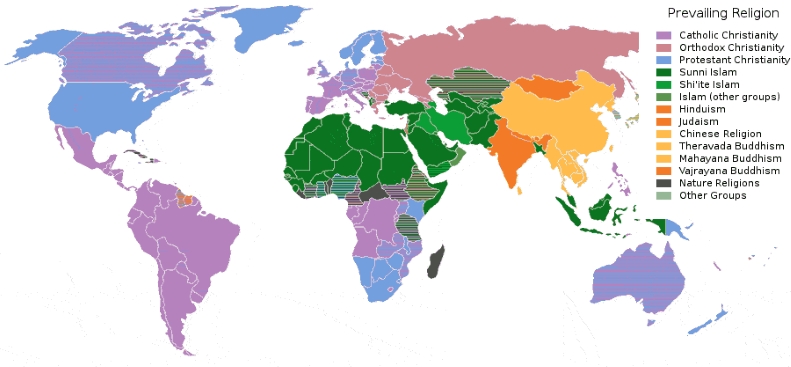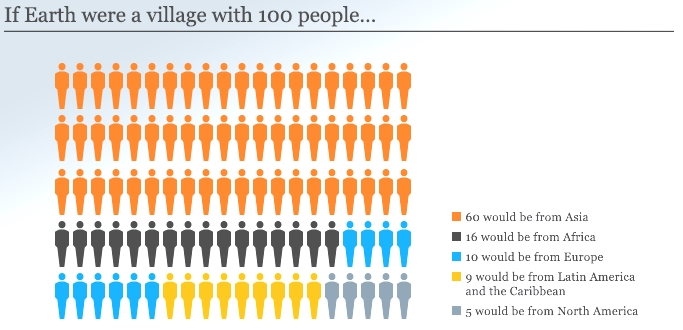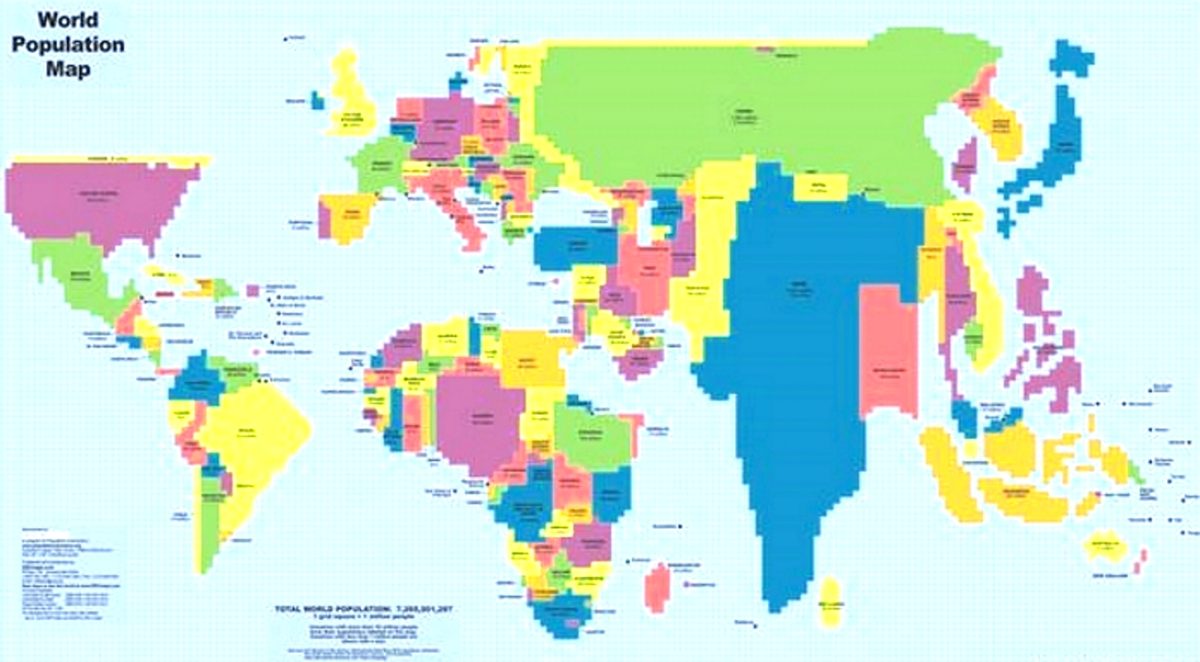The Universal Declaration of Human Rights issued by the UN General Assembly in Paris on 10 December 1948 (Resolution 217 A)[1]. Its 30 Articles spell out the rights of every human individual, applicable to everyone on the planet.
Only once – in one single line (Article 29, 1) – does the word “duty” appear. In effect, the whole declaration is an award of wide ranging rights to any and all individuals without any corresponding duties to society – such as, for instance, an obligation to possess reason, to be informed, enlightened …
Article 21 secures everyone “the right to take part in the government of his country, directly or through freely chosen representatives – their will shall be expressed in periodic and genuine elections which shall be by universal and equal suffrage and shall be held by secret vote or by equivalent free voting procedures”.
Not a word about any qualifications for voting – not even literacy …
The Webs of Interdependency
The present day world of over seven billion people live in around 220 different national entities and territories. Despite being divided by a multitude of crisscrossing ethnical, religious, linguistic, cultural, political as geographical boundaries, all are tied together by invisible layers of intricate, finely meshed webs of technical, financial, commercial and physical connections.
These webs create a mass of interdependencies in all fields and at all levels, the totality of which so complex and interwoven that no single individual or entity is able to overview it, let alone understand it – the same goes for political leaders. The World’s education systems turn out droves of specialists in all fields, who ably manage specific bits of the system – but the totality is unmanageable.
The Widespread Ignorance
Add to this the fact that the seven plus billion individuals who make up the global population are completely unaware of the actual complexity of these connections and interdependencies. Add also that in comparison to that complexity, the general level of knowledge of the average individual is so basic that they are not much better than analphabets – exacerbated by most educational curricula failing to impart essential knowledge of financial and economic basics.
The Absence of Responsibility
Looking at how the present day world is reeling under “democratic” referendums and structure-shattering elections, it is obvious that the chief cause is that questions of overriding international importance are put before uninformed, often practically illiterate people who are free to wield their vote without being held accountable – without a shred of responsibility – voting is secret.
Thomas Jefferson
United States Founding Father and author of the Declaration of Independence Thomas Jefferson (1743 – 1826) stated: ‘We hold these truths to be self-evident, that all men are created equal, that they are endowed by their Creator with certain unalienable Rights, that among these are Life, Liberty and the pursuit of Happiness”.
That is an impressive charter. Left out of that story, however, is that Jefferson presupposed that all men are persons of reason, not just anybody who happens to be alive.
Immanuel Kant
The ancient Greeks used the word “idiot» for someone not displaying interest in politics. For them, such a state remained an exception – not the rule[2] .
2000 years later, Immanuel Kant (1724 – 1804) turned this around, implying that lack of interest in the whys and wherefores is the natural state of the human being, while craving for enlightenment (aufklärung, opplysning) is exceptional, despite such potential residing in every human being.
Those who reach the state of the enlightened, autonomous individual are the illustrious few; scientists, scholars, statesmen, some artists, a few princes. This does not mean that most people are stupid – quite a lot of us are very smart idiots.
Kant’s Three Levels of Human Existence
In his work “Religion within the boundaries of Reason alone” Kant distinguishes between three levels of human existence:
- The bottom level is the purely organic reptile brain.
- The second is the unique level of intellectual cleverness man possesses, ranging from technical dexterity to the street-smart predator.
- Only on the third level do we find the specifically human side of human existence: responsibility and accountability.
The first two levels make up the animalistic side of our species – a very versatile animal. Describing the third level Kant uses the word responsibility in accordance with its inherent meaning:
the ability to respond to the demands, questions and evaluations of the community. The basis of this is the sense of right and wrong, in contrast to success and failure. The ability to respond in what is deemed an adequate and socially acceptable way, and act accordingly, is what makes up the responsible person.
This third level is always in conflict with the other two, which are tuned toward instant gratification of desire. lt is the task of parents and other eclucators to cultivate and reinforce the level of responsibility to the point where it masters the vegetative[3] and cunning levels both for individuals and for communities. Only when the third element wins, communities are transformed into civilization.
Therefore, the transition of a community from an embedded-in-nature state into civilization is also one of eliminating idiocy in favour of responsibility. Kant’s moral philosophy is centred on the concept of autonomy – he distinguishes between a person who is intellectually autonomous and one stays in an intellectually dependent and immature status.
Enlightenment
Kant defines «Enlightenment” (Aufklärung, opplysning) as man’s emergence from his self-inflicted immaturity. He argues that the immaturity is self-inflicted, not from a lack of understanding but from the lack of courage to use one’s reason, intellect, and wisdom without the guidance of another.
Kant understands the majority of people to be content to follow the guiding institutions of society (Church and Monarchy), unable to throw off the yoke of their immaturity due to lack of resolution to be autonomous. To work their way out of this immature, cowardly life is difficult for individuals because we are so uncomfortable with the idea of thinking for ourselves. The key to throwing off these chains of mental immaturity is reason.
Reason
Reason (Vernunft, fornuft) is the capacity for consciously making sense of things, establishing and verifying facts, applying logic, and changing or justifying practices, institutions, and beliefs based on new or existing information.
Bestowing rights on people without any corresponding obligations, without holding them accountable for their votes, without responsibility, is the certain way to disaster, considering the complexity of the web of inter-dependencies that constitute the present world, described above.
The United Nations
The statutes of The United Nations are a pitiful half measure: free right of veto, no global law enforcement, keeping up the system of completely sovereign states, issuing a statement of “Human Rights”, all about rights and noting about obligations – A concept that is but a bastard patched up from limbs of various derivations, and that looks like anything one chooses to see in it, has no essence. Void of integrity, it unavoidably gravitates toward the black hole of morally euthanized humanity. [3]
[1] The UN Declaration – 30 Articles, 8 pages – was followed two years later (Rome, November 1950) by de European Convention on Human Rights and Fundamental Freedoms – 59 Articles, 32 pages(since amended by 16 additional Protocols) – because several Articles of the UN Declaration were objectionable to some European nations (notably Norway opposed Article 20, part 2, preventing mandatory organisation memberships).
[2] Note that the “demos” of ancient Greece was made up purely of the upper classes of men (no servants, no slaves, no women), a very limited portion of the actual population.
[3] Kant’s use of “vegetative” here is in the sense of “living a life that is dull, inactive and unchallenging”
[4] Source in respect of Immanuel Kant: “Kant and the barbarians”, Carlos Wiggen, 2012 – ISBN: 1477666915



